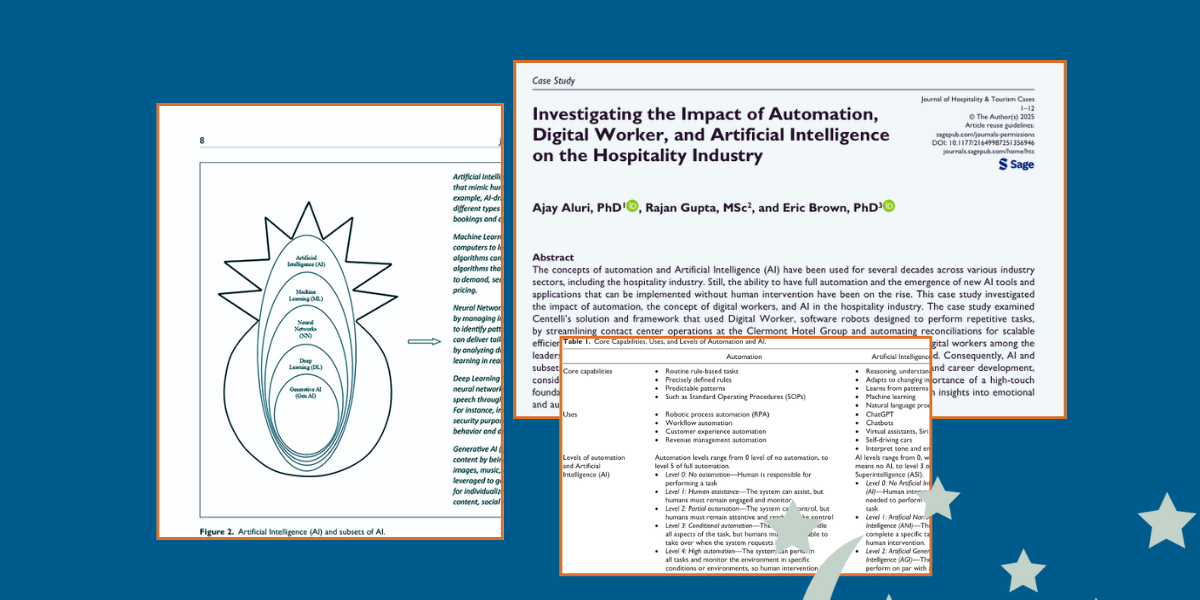
- Digital Workers
- Written By Rajan Gupta
Centelli’s Digital Workers in Hospitality Automation: Takeaways from the JHTC Case Study
07-Aug-2025 . 7 min read
Operating behind the scenes but making a front-line impact. Perhaps this is the best way to describe ‘Digital Workers in Hospitality Automation’.

Significantly, hospitality businesses are among the active adopters of automation and AI. Quite an interesting development for a people-centric, high-touch industry that thrives on face-to-face interactions.
In this blog, I share key takeaways from my academic collaboration with Ajay Aluri (West Virginia University) and Eric Brown (Iowa State University). Together, we’ve explored the critical drivers behind AI and automation adoption—and the transformative impact these technologies are bringing to hospitality operations.
The case study, titled Investigating the Impact of Automation, Digital Workers, and Artificial Intelligence on the Hospitality Industry, is published by SAGE’s Journal of Hospitality and Tourism Cases (JHTC).
The article also spotlights Digital Workers, with real-world examples of Centelli’s implementations examined, explained, decoded, and demystified.
Here’s the crux, along with my bonus insights and perspective for your benefit. Dive in!
The Widening Ambit of Hospitality Automation
The hospitality industry has undergone massive change, much of it triggered by the COVID-19 pandemic. Significantly, the JHTC-Centelli case study rightly underscores the pivotal shifts it caused in the Hospitality and Travel sector.
Digitalization was already gaining ground, but the pandemic became a watershed moment—accelerating automation in unprecedented ways across organizations, consumers, and employees alike.
This is how it has played out:
- Travel restrictions and quarantine protocols reshaped consumer behavior and expectations. Businesses shifted toward more online—and fewer physical—environments. Consumers began avoiding in-person touchpoints for safety—something that eventually evolved into a preference for convenience and time saving.

- There was a massive boom in e-commerce platforms and online services during the pandemic era. Many businesses and workplaces that moved online to weather the COVID crisis have since found value in adopting a hybrid model.
- These consumer shifts also influenced employee preferences. Remote and hybrid work, health and safety concerns, and the desire for better work-life balance led many to switch sectors.
- Hospitality and travel companies, like many others, faced workforce challenges and evolving customer demands. They were compelled to look for solutions—and found one through automation.
AI, Automation and Digital Workers: A Pivot for the Hospitality Industry
Businesses are responding to evolving landscapes—consumer behavior, employee expectations, and operational environments—by seeking digital solutions that are simple, convenient, and efficient, the JHTC case study notes.
We at Centelli couldn’t agree more, as we’ve helped our many clients become more resilient, effective, and agile through automation. Here’s what we’re seeing:
- Hospitality businesses are reducing manual workflows, especially repetitive, rule-based tasks—saving time and eliminating human error.
- Faster, more accurate processes improve customer experience and satisfaction. Happier customers = better reputation = more business.
- Companies are optimizing resources, streamlining costs, and boosting growth by combining human and tech in smart ways.
- AI-powered tools, including chatbots, automated check-ins, digital concierge systems, and digital worker process automations are becoming commonplace in hospitality.
Digital Workers in Hospitality Automation: Seamless, Efficient Operation
Increasing use of IoT-enabled devices by businesses and individuals, talent shortages, and rising wage demands are among the core reasons to automate processes where they make the most sense for both efficiency and cost optimization.

Technology is taking on a definitive role as human resources across the board brace for the new paradigm.
In this context, the JHTC-Centelli case study explores:
- The impact of automation and AI—its capabilities, uses, and levels in hospitality.
- The automation landscape through the digital worker framework using Robotic Process Automation (RPA), with real implementation use cases.
- Subsets of AI, the future of Intelligent Process Automation (IPA), and the importance of high-touch hospitality.
You’ll also find real-world examples offering valuable insights into Centelli’s Digital Worker implementations at Davidson Hospitality Group, Clermont Hotel Group, and others.
From classic RPA to Digital Workers, we at Centelli have steadily expanded and innovated our custom-built solutions to include AI-led RPA, intelligent process automation (IPA), and now, agentic automation as well.
Importantly, our Digital Workers also continue to become more advanced and capable, powered by large language models (LLMs), generative AI, and beyond.
Data Privacy and Compliance with Hospitality Digital Workers
The article also thoughtfully addresses data privacy and compliance concerns. It explains that Digital Workers for Hospitality Automation operate within the existing user interface of hotel systems.
This ensures these bots:
- Cannot access data in uncontrolled or unauthorized ways
- Adhere to the original privacy settings and permission structures already built into the software
This rules-based, UI-driven method provides a grounded way to bring AI into operations without compromising guest trust or regulatory obligations.

Notably, Centelli’s Digital Workers embody this approach—each bot mimics a human employee, following defined steps and using business systems as they were intended.
This means:
- No shortcuts through backend access
- No exposure to unnecessary data
- Reduced cybersecurity risk
So, it’s a framework designed for responsible AI use from the start.
AI and Automation: From a Hospitality Employee Perspective
The case study as well touches on a key concern: AI and automation can trigger anxiety among employees. Non-managerial staff may feel job insecurity, especially.
But employees need to see how AI and automation can enhance—not replace—their work, especially in guest-facing roles.
And organizations must help staff understand how these tools improve service quality and customer satisfaction, which in turn drives business growth and job stability.
Here’s how hospitality staff benefit:
- Automation reduces excessive workloads, helping staff complete tasks faster and avoid burnout. Better work-life balance!
- Employees can focus on strategic, creative, and personal interaction tasks—areas where tech can’t add value. This opens doors for strategic roles and professional growth.

Want full access to the case study? Get your copy here: SAGE’s Journal of Hospitality & Tourism Cases.
Hospitality Digital Worker Adoption FAQs
1. Why are Digital Workers a smart fit for hospitality—and is the industry catching on?
Awareness is growing, but many still don’t realize how practical and adaptable automation has become. Digital Workers—software-based team members—can handle time-consuming, repetitive tasks like data entry, reporting, and system updates. This frees up human staff to focus on guests and high-value work. It’s not about replacing people; it’s about supporting them in smarter, more sustainable ways.
2. How does Centelli address concerns about job loss from automation among their clients’ staff?
The key is education and involvement. We work closely with staff to show how automation supports them—reducing burnout, freeing up time for guest engagement, and opening up paths to more meaningful roles. Rather than replacing jobs, Digital Workers enhance human contribution by taking over tasks the employees wish they didn’t have to do in the first place.
3. What’s the biggest takeaway for hospitality leaders from Centelli’s work with Digital Workers?
Digital Workers aren’t theoretical—they’re already solving real problems in hospitality. From eliminating manual tasks to improving accuracy and guest service, they allow staff to focus on what matters most. Our case study shows how automation can be thoughtfully applied to create smarter operations without compromising the human touch that defines this industry.
The Way Forward
As hotels, restaurants, and travel companies compete for customers, they face another challenge: delivering seamless service while managing rising costs, staffing issues, and shifting customer expectations.

Hospitality is—and will remain—a people-first function. Yet, digitalization has permeated nearly every aspect of operations, with automation and AI reshaping the industry in new ways.
The way forward? As the study notes, business leaders and tech experts must identify how automation and AI can redefine hospitality roles and find effective ways to upskill or reskill the workforce to ensure a win-win for all.


